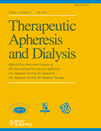
THERAPEUTIC APHERESIS AND DIALYSIS
Scope & Guideline
Exploring cutting-edge methodologies in apheresis and dialysis.
Introduction
Aims and Scopes
- Therapeutic Apheresis:
The journal emphasizes the role of therapeutic apheresis in treating various medical conditions, including autoimmune disorders, hematological diseases, and complications arising from chronic kidney disease. It includes studies on the efficacy and safety of procedures such as plasma exchange and leukapheresis. - Dialysis Modalities:
Research on different dialysis modalities, including hemodialysis and peritoneal dialysis, is a core focus. The journal covers topics related to the optimization of dialysis techniques, patient management, and long-term outcomes of dialysis therapies. - Innovative Treatment Approaches:
The journal highlights innovative treatment approaches, such as the use of machine learning in predicting patient outcomes, novel dialysis membranes, and blood purification technologies. This includes advancements in therapeutic devices and their clinical applications. - Patient-Centered Care:
Studies focusing on patient-centered care, quality of life, and psychosocial aspects of treatment in patients undergoing dialysis and apheresis are integral. This includes research on patient education, adherence to treatment, and shared decision-making. - Epidemiology and Outcomes:
The journal publishes epidemiological studies that assess patient populations undergoing dialysis and apheresis, detailing outcomes related to mortality, morbidity, and complications associated with these therapies.
Trending and Emerging
- Machine Learning and Predictive Analytics:
There is a growing trend towards utilizing machine learning and predictive analytics in the management of dialysis and apheresis patients. This includes developing models to predict outcomes such as mortality and treatment response, indicating a shift towards data-driven decision-making. - Patient Quality of Life and Psychosocial Factors:
Recent publications have increasingly focused on the quality of life, mental health, and psychosocial factors affecting patients undergoing dialysis and apheresis. This trend highlights the importance of holistic care in managing chronic kidney disease. - Advanced Dialysis Technologies:
Emerging technologies, such as medium-cut-off dialyzers and innovative blood purification methods, are gaining traction in the literature. Research into these advanced modalities aims to improve patient outcomes and reduce complications. - COVID-19 Impact Studies:
The ongoing impact of COVID-19 on patients undergoing dialysis and apheresis has led to a surge in related research. Studies addressing infection rates, vaccine responses, and management strategies during the pandemic have become increasingly relevant. - Nutritional Interventions:
An increasing number of studies are focusing on nutritional interventions and their effects on patients undergoing dialysis. This emerging theme explores the links between nutrition, inflammation, and overall health outcomes in this population.
Declining or Waning
- Basic Science Research:
There has been a noticeable decline in basic science research related to the mechanisms of apheresis and dialysis. As clinical applications and outcomes take precedence, foundational studies seem to be less frequently published. - Traditional Dialysis Techniques:
Research focusing solely on traditional dialysis techniques without innovation or comparative analysis appears to be waning. As newer technologies and methodologies are developed, studies on conventional approaches are becoming less prominent. - Apheresis in Non-Renal Diseases:
The exploration of apheresis applications in non-renal diseases has decreased. While apheresis remains relevant for renal conditions, its use in broader medical contexts appears less frequently discussed in recent publications. - Longitudinal Studies:
Longitudinal studies that track outcomes over extended periods have become less common. This may reflect a shift towards more immediate, short-term studies that provide quicker results and insights. - Economic Evaluations:
Research focusing on the economic aspects of apheresis and dialysis, including cost-effectiveness analyses, seems to be less represented. As funding and resources shift, this area may be receiving less attention.
Similar Journals
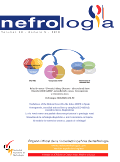
NEFROLOGIA
Connecting nephrologists through impactful research.NEFROLOGIA is a preeminent scientific journal published by the SOCIEDAD ESPAÑOLA DE NEFROLOGÍA DR. RAFAEL MATESANZ, specializing in cutting-edge research and clinical advancements in the field of nephrology. Established in 1981 and continuing through 2024, this journal serves as a crucial platform for nephrologists, researchers, and healthcare professionals to disseminate knowledge and foster dialogue on critical issues affecting kidney health. With its ISSN 0211-6995 and E-ISSN 1989-2284, NEFROLOGIA is indexed in prestigious databases, ranking #35 out of 81 in the Scopus Medicine Nephrology category, reflecting its significance within the medical community. Although it does not currently offer open access, the journal ensures wide accessibility and readership through institutional subscriptions. Researchers and clinicians are invited to contribute their findings and reviews, advancing our understanding and treatment of renal diseases. Through its commitment to high scholarly standards and impactful research, NEFROLOGIA remains a vital resource for those dedicated to improving kidney care and advancing nephrology sciences.
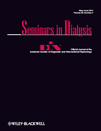
SEMINARS IN DIALYSIS
Pioneering research and insights in kidney health.SEMINARS IN DIALYSIS is a reputable peer-reviewed journal published by WILEY, focusing on advancements in the field of nephrology, particularly in the context of dialysis. With its ISSN 0894-0959 and E-ISSN 1525-139X, this journal serves as an essential resource for researchers, healthcare professionals, and students committed to exploring innovative practices and solutions in kidney health. Since its inception in 1988 and continuing to 2024, the journal has established itself in the Q2 category of nephrology, highlighting its significance in academic discourse, as reflected by its Scopus rank of #42 out of 81 in the field. Although not openly accessible, SEMINARS IN DIALYSIS offers crucial insights into clinical practices and research findings that shape the future of dialysis treatment, making it a cornerstone publication for those dedicated to improving patient outcomes in nephrology.
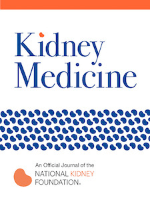
Kidney Medicine
Bridging research and practice in nephrology.Kidney Medicine is a pioneering Open Access journal dedicated to advancing the field of nephrology and internal medicine, published by Elsevier. Since its inception in 2019, it has rapidly established itself as a vital resource, currently ranked in the Q2 category for Internal Medicine and Q1 for Nephrology by 2023, reflecting its influence and critical contributions to both disciplines. With an impressive Scopus ranking, positioning it at #24 out of 81 in Nephrology, the journal serves as an essential platform for researchers, clinicians, and students eager to disseminate and access high-quality research. By providing open access to a diverse array of articles, Kidney Medicine ensures that vital research reaches a wide audience, thereby facilitating knowledge exchange and innovation within the community. Its ongoing commitment to excellence and relevance makes it a key player in shaping the future of kidney health worldwide.

Canadian Journal of Kidney Health and Disease
Transforming kidney care with innovative research.Canadian Journal of Kidney Health and Disease, published by SAGE Publications Inc, is a leading open-access journal dedicated to advancing the field of nephrology. Established in 2014, the journal aims to bridge the gap between research and clinical practice by disseminating high-quality clinical and experimental research findings, reviews, and case studies that focus on kidney health and associated disorders. With an impressive impact factor and ranked in the Q2 category for nephrology, the journal fosters an environment for interdisciplinary collaboration and innovation, enhancing the visibility of crucial advancements in kidney disease research. As an open-access journal, it ensures that valuable knowledge is accessible to researchers, healthcare professionals, and students globally, facilitating a deeper understanding of kidney health issues and promoting improved patient care. Located in the United Kingdom, the journal continues to expand its reach and influence within the nephrology community, leveraging its open-access model to encourage a diverse audience in exploring cutting-edge findings and sharing insights pertinent to kidney health.

Turkish Journal of Nephrology
Exploring the forefront of nephrology science.Turkish Journal of Nephrology, published by AVES, serves as a pivotal platform for disseminating significant research in the domains of nephrology, transplantation, and surgery. Since its establishment as an Open Access journal in 2019, it has gained traction for delivering high-quality, peer-reviewed articles that reflect the latest advancements and practices in these critical medical fields. Based in Turkey, this journal has rapidly become an important resource, particularly for researchers and healthcare professionals striving to enhance kidney healthcare strategies. Despite being categorized in the fourth quartile across its main categories for 2023 and having modest rankings within Scopus, its commitment to openness and accessibility fosters a collaborative academic environment that promotes knowledge sharing. We encourage scholars, practitioners, and students to engage with the journal's content to further drive innovation and improve patient outcomes in nephrology and associated disciplines.
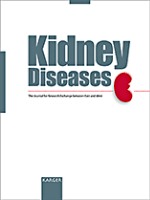
Kidney Diseases
Empowering global collaboration in kidney research.Kidney Diseases is an esteemed open-access journal published by KARGER that has been at the forefront of nephrology research since its inception in 2015. With an impressive Scopus ranking of #13 out of 81 in the field of Medicine Nephrology, placing it in the top 84th percentile, the journal has established itself as a vital resource for researchers, clinicians, and students interested in advancing knowledge on kidney health, disorders, and innovative treatment strategies. This journal aims to disseminate cutting-edge findings and clinical insights over a converged publication span from 2019 to 2024, fostering global collaboration and dialogue within the scientific community. With its commitment to open access, Kidney Diseases ensures that critical research is freely accessible, promoting wider dissemination of knowledge and the development of effective therapeutic interventions.

Iraqi Journal of Hematology
Connecting Global Scholars in Blood ScienceIraqi Journal of Hematology is a prominent peer-reviewed open-access journal dedicated to advancing the field of hematology. Published by Wolters Kluwer Medknow Publications, this journal provides a platform for researchers, professionals, and students to share cutting-edge findings and developments in various aspects of hematology, including blood diseases, diagnostics, and innovative treatments. Since its transition to open access in 2016, the journal has significantly increased its reach, allowing for wider dissemination of critical research to a global audience. With an ISSN of 2072-8069 and an E-ISSN of 2543-2702, the Iraqi Journal of Hematology strives to adhere to the highest scholarly standards and plays a vital role in the ongoing discourse in hematological research. Researchers are encouraged to contribute to this essential resource for the scientific community, contributing to the advancement of knowledge that ultimately improves patient care and treatment outcomes.
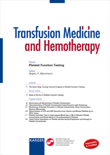
TRANSFUSION MEDICINE AND HEMOTHERAPY
Empowering innovation in hematology and transfusion medicine.TRANSFUSION MEDICINE AND HEMOTHERAPY, published by KARGER, is a prominent journal dedicated to advancing the fields of hematology and transfusion medicine. With an ISSN of 1660-3796 and E-ISSN 1660-3818, this esteemed journal has been a valuable resource for researchers and clinicians since its inception in 1973, with significant publication phases continuing into 2024. It currently holds a Q2 ranking in Hematology and a Q3 ranking in Immunology and Allergy, reflecting its impact and relevance in these critical fields. The journal features original articles, reviews, and clinical studies, presenting cutting-edge research that aids in the development of effective therapies and enhances patient care. Open access options are available, ensuring that crucial findings are accessible to a broad audience. As an important platform for dialogue and advancement in transfusion science, TRANSFUSION MEDICINE AND HEMOTHERAPY supports the global health community's efforts to improve treatment outcomes and foster innovation in medical practices.

International Journal of Nephrology
Connecting academia and clinical practice in kidney care.The International Journal of Nephrology is a premier peer-reviewed journal published by HINDAWI LTD, dedicated to advancing the field of nephrology through the dissemination of high-quality research. With an ISSN of 2090-214X and an E-ISSN of 2090-2158, this open-access journal has been providing a platform for scholarly articles since 2010, ensuring that both researchers and practitioners have immediate access to the latest findings in kidney health and disease. As of 2023, it holds a reputable Q2 rating in the nephrology category, ranking 36th out of 81 journals in Scopus, placing it in the 56th percentile. The journal aims to foster innovation and collaboration within the nephrology community by covering a broad scope of topics, including clinical and experimental research, innovative treatments, and public health initiatives related to kidney disorders. Situated in the United States, the International Journal of Nephrology is committed to enhancing understanding and improving outcomes in nephrology by bridging academia with clinical practice, making it an essential resource for academics, clinicians, and students alike.
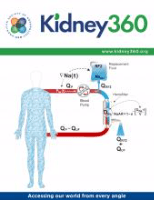
Kidney360
Connecting disciplines to enhance kidney health.Kidney360 (ISSN: 2641-7650) is a prominent open-access journal published by the American Society of Nephrology, dedicated to advancing the field of nephrology and its intersecting medical disciplines. Established with a vision to foster innovative research and promote a deeper understanding of kidney health, this journal is positioned as a vital resource for nephrologists, researchers, and healthcare professionals. With its classification in Q1 in Nephrology and Q2 in Medicine (miscellaneous) for 2023, Kidney360 ranks favorably, highlighting its commitment to publish high-quality, impactful research, recognized in the top percentile of its field. The journal's accessible platform aims to disseminate knowledge effectively, making it an essential repository for cutting-edge studies, reviews, and clinical research. By encouraging collaboration across various disciplines, Kidney360 plays a critical role in shaping the future of nephrology and enhancing patient care on a global scale.